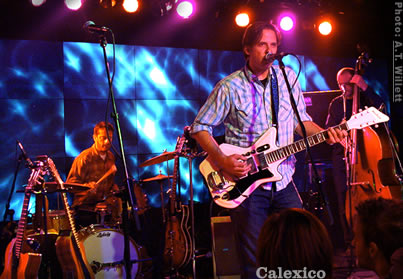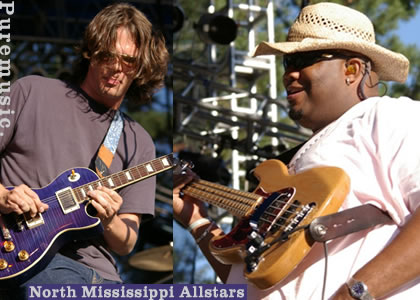
A Conversation with
Andrew Shapter
(continued)
PM: I thought that there was a noticeable dearth of musicians in their twenties in this film. Don't you agree?
AS: I agree. And again, some other critics didn't notice that. There were a lot of younger musicians we wanted to feature that believe in good--they represent great American music. So yeah, my particular favorite in the movie is the sort of biracial gem with North Mississippi Allstars.
PM: That was totally cool. I love those guys. [see our interview with Luther and Cody Dickinson]
AS: Yeah, yeah.
PM: Yeah, not only were they jammin', I mean, but these are the people they grew up with, and like their best friends and stuff.
AS: They still live in Coldwater, Mississippi. They didn't move to Hollywood. They are what they are. You see what you get. Or you get what you see.
PM: On the other hand, I also just watched a musical documentary recently, called What is Indie? I don't know if you've seen it.
AS: No.
PM: In that, there were a lot of musicians in their twenties, but what they had to say was not particularly interesting to me, which I was dismayed by; and for that reason, I was glad that most of the musicians speaking in your film were largely a little older, and they were speaking more profoundly.
AS: Well, I mean, it's their life, and they're talking about the most important thing in their life, which is their music and their audience. And so of course they're going to be well thought out in their answers. And for them to understand the dynamics, and how the dynamics have changed, and how lucky they are to even have a label in this day and age was great, because there's a humble nature to North Mississippi Allstars and My Morning Jacket, and Calexico--
PM: Absolutely.
AS: --because they know the climate has changed.
PM: Absolutely.
I thought it was really good the way for the average listener, you kind of spelled out the story of, "Here's what happened with Clear Channel." [The conglomerate that swallowed up well over a thousand radio stations, and singlehandedly changed radio in ways that many people call disastrous.]
AS: Right. Well, a lot of people don't know.
PM: Right.
AS: And going back to music critics again, this is old news to them, they've heard it before, blah, blah, blah. But a lot of people said, "I never knew why so many stations play the exact same songs, and the songs have gotten narrowed down to ten or twenty, tops."
PM: Of course not, how were they supposed to know that?
AS: Well, no, they don't, because nobody has ever taken on Clear Channel.
PM: Yeah.
AS: I know Clear Channel is not very happy with me for doing it, but--
PM: I'm going to have lunch with a buddy this week who works for Clear Channel, and I'm going to loan him this DVD and say, "Check this out, my man."
[laughter]
AS: I think it's interesting that the same time the film came out, like almost to the day--they released that press release that said they were selling off 400 or 500 stations. Right when the film came out. They're cutting off some dead weight and fat, and they're not too happy about their recent publicity. I don't know how much the film is contributing, I hope it's contributing a lot. But who knows?
PM: I mean, the big question cannot be of course, "What the hell has happened to the music business," but "Where is this thing going? And will creative musicians who don't look like the most attractive one percent of the world be able to survive, and how?" And I think a lot of those--all of those things I think were well addressed in the movie. And I think it's going to really stimulate a lot of thought on the part of not just the musician part of the world, but the listener part of the world, about, well, how am I going to interact with this problem?
AS: Exactly.
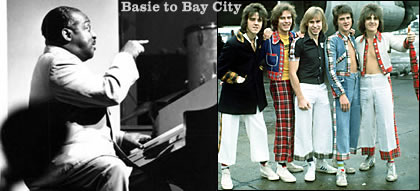
And for me, as a filmmaker and a father, I just didn't want my daughter growing up and idolizing musicians and their beauty. I wanted her to idolize the music, like I did. Because at her age I was listening to everything from Bay City Rollers to Count Basie. So I had a wide range of taste. And I credit my family, my brother and my dad, for all that. I just don't want her to grow up not being familiar with what a saxophone looks like, because you never see those anymore.
PM: [laughs]
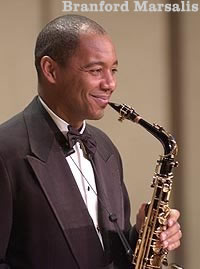
AS: And then I would rather her idolize somebody that's playing an instrument, like Bonnie Raitt, than somebody shaking her ass in the shortest shorts possible. I mean, pop music has always existed, that whole teen thing has always existed, but it's never been the main part of the industry. It's always been the money making part of the record label. But now labels completely surround their entire business model around them.
PM: Yeah, I mean, it's one of the money making parts. But it was very interesting for Bonnie Raitt, for instance, to say that, "hey, people like me and Little Feat and Randy Newman, we only got to record because of the sales of Deep Purple and Black Sabbath." [laughs]
AS: Everybody points that out as being really interesting, nobody ever really thought about that. I think another thing that's interesting is that the labels will say, "Well, that's what teenagers want. They want their singers to be cute, that's what people expect now, and that's just the way of America." Well, I would say, if that's true, then why do all the American Idol winners look so completely different, and not like pop stars?
PM: Ah.
AS: They've got Ruben Studdard; and the fellow that won most recently, he had a full head of gray hair, just a common regular Joe. So you got to wonder if they're right or not.
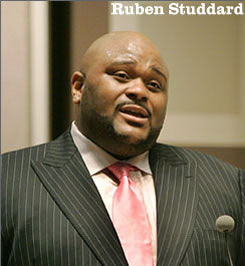
PM: Well, that's a very interesting observation. I like that. I thought Questlove talking about being the last black band with a major record deal was shocking!
AS: Well, he's right. And I would challenge anybody to try to prove him wrong. And what he's saying is that they're the last black band to play instruments on stage.
PM: Right.
AS: And he was not kidding. I went back and researched it, and he was dead right.

PM: I'll bet money that when the black community sees that in that movie that black bands will sprout out as a result going, "Well, hell with that."
AS: Well, that's interesting you say that, because it's probably our core audience. I get more letters from the black community than any other group. It seems like they've known it for a long time, and they've noticed it for a long time. There are no more bands like Earth Wind & Fire, The Commodores, and The Roots.
PM: Right.
AS: And they've noticed it. Their attitude has been like, "Thank you for making this movie, for telling this story."
PM: God, that's also interesting that you got so many letters from the black community. That surprises me. Well, if the progressively failing music business model will drive consumers to buy CDs or downloads online from artists and small labels, maybe the music business really is going to reinvent itself.
AS: We hope so.
PM: But I know it's never going to happen if the younger generation and people like XM don't realize that downloading without paying is stealing. It's so lame I don't know how to put it into words!
AS: Well, I think the guy that put it into words best was the guy from Widespread Panic, it's like it's the same thing as shoplifting, but because it's bits and ones and zeros doesn't mean that it's not shoplifting.
PM: Yeah. It's called intellectual property, folks.
AS: Yep.
PM: Well, Andrew, I just think what you guys have done here is extremely important, and I'm very, very happy that you and I could have a conversation about it today. And we will urge our readers to buy this DVD instead of a sweater for the music minded friends and family on their list.
AS: I'll tell you, we could use all the help we can get, because we don't have the money to buy television advertising for instance. The only way we can survive and get the word out is guys like you. So it's much appreciated.
PM: Yeah, and I couldn't be more interested in helping with that. And like I say, I hope to meet you soon.
AS: Well, thank you, Frank. Maybe I'll see you in Nashville pretty soon.
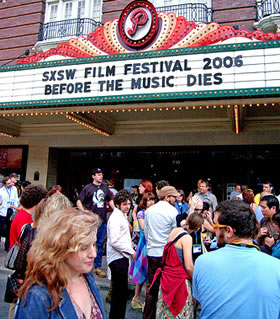
continue to our review of B4MD
print pdf of the interview + review return to intro
beforethemusicdies.com buy the DVD here or via here
bside.com find a screening andrew's myspace
and thanks to A.T. Willett for his Calexico photo
